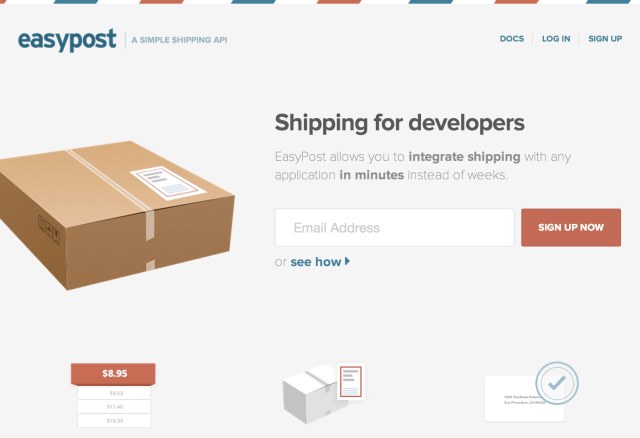With more commerce moving online every day, the shipping industry is in need of innovation. And one of the bigger pain points developers face when trying to integrate postage and shipping into their applications involves the antiquated technology major carriers like FedEx, UPS and USPS provide – complex SOAP or XML APIs that most developers would say are a nightmare to work with. San Francisco-based EasyPost is trying to solve that problem by offering a simpler, RESTful JSON API instead. Today, the company is announcing $850,000 in seed funding to help with those efforts.
Investors in the new round, which just now closed, include Y Combinator, SV Angel, Start Fund, CrunchFund*, Mesa+, Andreas Resch, Kevin Barenblat, Lars Kamp, Ullas Naik, Shawn Bercuson, and Rahul Vohra. (* Disclosure: CrunchFund founder Michael Arrington also founded TechCrunch.)
EasyPost co-founder Jarrett Streebin says he came up with the idea for the service based on his own experiences with having to integrate shipping into some of the websites he had worked on in the past. These were generally just weekend projects he played with on the side while analyzing venture deals for a private investment fund at his day job.
But he also spoke to other startup founders through his work, and found that they, too, had the same struggles with shipping. He would ask them about it, and routinely, the answer would be one of frustration. “Oh my god, it’s a nightmare,” they would tell him.
Explains Streebin, “if you go to Twilio, you can get an API key immediately. But if you go to Endicia or some of their competitors, you have to email them and they send you 400-page documentation, and then you have to sign a legal doc…It’s really a big mess,” he says.
“We need a Stripe for this,” Streebin realized.
Founded alongside ex-Googler Jon Calhoun, EasyPost first launched into beta this September and immediately saw around 500 sign-ups, indicating the need for the service it provides. Today, the company has double that in terms of users, and after its public debut in January, it has been seeing numbers double every single month in terms of revenue and number of packages, Streebin says.
To use the service, developers come to the site, enter in their account information for UPS, FedEx, or USPS, and then get an API key they can use to access all the functions provided. [Update, 6/11/13: The company previously told us that this is how the system works, but have today clarified that it’s still in the process of getting FedEx and UPS approval. Given the belated request, it’s unclear when that will occur.]
E-commerce sites can then call the API to verify addresses during checkout, let customers choose from all the different possible shipping options, and even purchase that shipping label as part of the fulfillment process.
Because of the complexity of the carriers’ own APIs, most e-commerce sites don’t allow for this kind of thing today – instead, they often pick a flat rate that seems reasonable. This is not only a problem for them, as sometimes shipping charges are higher than that flat rate, but it can also be a problem for the consumer who misses out on savings when rates should be lower.
This same problem has led to a number of new developments in the shipping and logistics industry, including the launch of EasyPost’s direct competitor Postmaster (with $600,000 in seed funding), as well as consumer-facing TechCrunch Disrupt NY 2013 audience choice winner ShipHawk, and more broadly, moves from big-name brands like Amazon, eBay, Walmart and Google, all of whom who are now trying to figure out how to make same-day shipping sustainable.
Where EasyPost wants to differentiate itself from other developer-facing tools is with its level of support. “My belief from the start is that if you’re selling SaaS, PaaS, infrastructure-as-a-service – any of those – the support is the product. Our support times are 10 minutes or less,” Streebin claims.
Currently EasyPost charges 5 cents per shipment, but offers discounted rates for larger shippers. It plans to add more long tail U.S. carriers as well as Canada Post within the next few months, then work on Europe afterwards.
Interested developers can sign up here.

